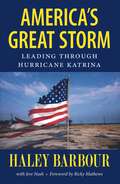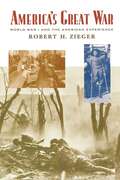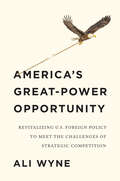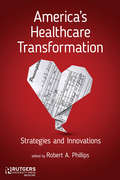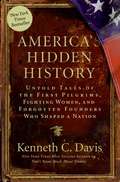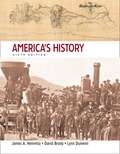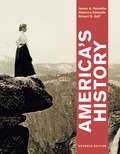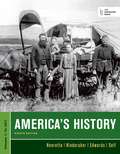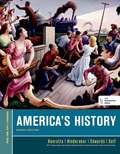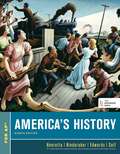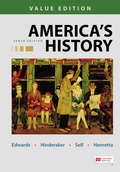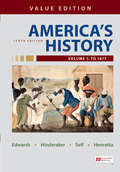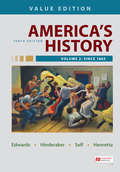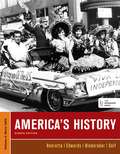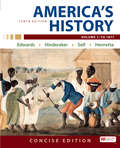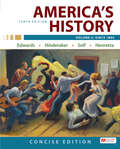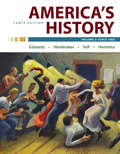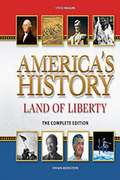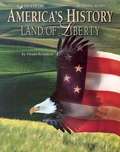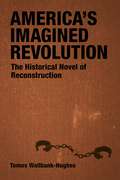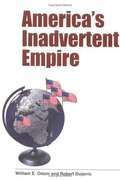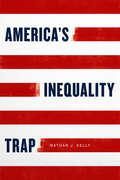- Table View
- List View
America's Great Storm: Leading through Hurricane Katrina
by Haley BarbourWhen Hurricane Katrina hit Mississippi on August 29, 2005, it unleashed the costliest natural disaster in American history, and the third deadliest. Haley Barbour had been Mississippi's governor for only twenty months when he assumed responsibility for guiding his pummeled, stricken state's recovery and rebuilding efforts. America's Great Storm is not only a personal memoir of his role in that recovery, but also a sifting of the many lessons he learned about leadership in a time of massive crisis. For the book, the authors interviewed more than forty-five key people involved in helping Mississippi recover, including local, state, and federal officials as well as private citizens who played pivotal roles in the weeks and months following Katrina's landfall. In addition to covering in detail the events of September and October 2005, chapters focus on the special legislative session that allowed casinos to build on shore; the role of the recovery commission chaired by Jim Barksdale; a behind-the-scenes description of working with Congress to pass an unprecedented, multi-billion-dollar emergency disaster assistance appropriation; and the enormous roles played by volunteers in rebuilding the entire housing, transportation, and education infrastructure of South Mississippi and the Gulf Coast. A final chapter analyzes the leadership skills and strategies Barbour employed on behalf of the people of his state, observations that will be valuable to anyone tasked with managing in a crisis.
America's Great War: World War I and the American Experience (Critical Issues In American History)
by Robert H. ZiegerRecent bestsellers by Niall Ferguson and John Keegan have created tremendous popular interest in World War I. In America's Great War prominent historian Robert H. Zieger examines the causes, prosecution, and legacy of this bloody conflict from a frequently overlooked perspective, that of American involvement. <p><p> This is the first book to illuminate both America's dramatic influence on the war and the war's considerable impact upon our nation. Zieger's engaging narrative provides vivid descriptions of the famous battles and diplomatic maneuvering, while also chronicling America's rise to prominence within the postwar world. On the domestic front, Zieger details how the war forever altered American politics and society by creating the National Security State, generating powerful new instruments of social control, bringing about innovative labor and social welfare programs, and redefining civil liberties and race relations. America's Great War promises to become the definitive history of America and World War I.
America's Great-Power Opportunity: Revitalizing U.S. Foreign Policy to Meet the Challenges of Strategic Competition
by Ali WyneIt has become axiomatic to contend that U.S. foreign policy must adapt to an era of renewed “great-power competition.” The United States went on a quarter-century strategic detour after the Cold War, the argument goes, basking in triumphalism and getting bogged down in the Middle East. Now China and Russia are increasingly challenging its influence and undercutting the order it has led since 1945. How should it respond to these two formidable authoritarian powers? In this timely intervention, Ali Wyne offers the first detailed critique of great-power competition as a foreign policy framework, warning that it could render the United States defensive and reactive. He exhorts Washington to find a middle ground between complacence and consternation, selectively contesting Beijing and Moscow but not allowing their decisions to determine its own course. Analyzing a resurgent China, a disruptive Russia, and a deepening Sino-Russian entente, Wyne explains how the United States can seize the "great-power opportunity" at hand: to manage all three of those phenomena confidently while renewing itself at home and abroad.
America's Healthcare Transformation: Strategies and Innovations
by Thomas H. Lee Sandra A. Weiss Nikhil G. Thaker Arthur Tim" Garson David W. Bates Hanh H. Hoang Philip Greenland Tine Hansen-Turton Sarah Slight James L. Field Susan A. Abookire Thomas W. Feeley Amir Rubin Janet J. Teske Julia D. Andrieni Alicia D.H. Monroe Kenneth Patric Steven R. Steinhubl Elizabeth Malcolm Nana Ekua Coleman Mark R. Chassin William S. Weintraub Kasey R. Boehmer Arnold Milstein Sharyl Wojciechowski Marc L. Boom Victor M. Montori Henry H. Ting Ju Young Kim Erin S. Dupree Gary S. Kaplan Mauro Ferrari Jason Gorevic Kasaiah Makam Kunal N. Karmali Alberta T. Pedroja Dr Robert A. Phillips Deirde MylodA revolution in American medicine is in full swing, with the race from fee-for-service to fee-for-value at the front line in an epic battle that will transform healthcare delivery for decades to come. In America's Healthcare Transformation, eminent physician leader Robert A. Phillips brings together key thought leaders and trail-blazing practitioners, who provide a wide-ranging exploration of the strategies, innovations, and paradigm shifts that are driving this healthcare transformation. The contributors offer a panoramic look at the dramatic changes happening in the field of medicine, changes that put the patient at the heart of the process. Among other subjects, the essays evaluate innovative high quality and low cost care delivery solutions from around the United States and abroad, describe fundamental approaches to measuring the safety of care and the impact that guidelines have on improving quality of care and outcomes, and make a strong case that insurance reform will fundamentally and irreversibly drive delivery reform. In addition, America's Healthcare Transformation reviews the role of health information technology in creating safer healthcare, provides a primer on the development of a culture of safety, and highlights ground-breaking new ways to train providers in patient safety and quality. Finally, the book looks at reports from Stanford Health Care and Houston Methodist which outline how successful behaviorally based strategies, anchored in values, can energize and empower employees to deliver a superior patient experience. Drawing on the wisdom and vision of today's leading healthcare innovators, America's Healthcare Transformation provides a roadmap to the future of American healthcare. This book is essential reading for all health care providers, health care administrators, and health policy professionals, and it will be an invaluable resource in the effort to improve the practice of medicine and the delivery of healthcare in our communities and nation.
America's Hidden History
by Kenneth C. DavisKenneth C. Davis, author of the phenomenal New York Times bestseller Don't Know Much About History, presents a collection of extraordinary stories, each detailing an overlooked episode that shaped the nation's destiny and character. Davis's dramatic narratives set the record straight, busting myths and bringing to light little-known but fascinating facts from a time when the nation's fate hung in the balance. Spanning a period from the Spanish arrival in America to George Washington's inauguration in 1789, America's Hidden History details these episodes, among others: The story of the first real Pilgrims in America, who were wine-making French Huguenots, not dour English Separatists The coming-of-age story of Queen Isabella, who suggested that Columbus pack the moving mess hall of pigs that may have spread disease to many Native Americans The long, bloody relationship between the Pilgrims and Indians that runs counter to the idyllic scene of the Thanksgiving feast The little-known story of George Washington as a headstrong young soldier who committed a war crime, signed a confession, and started a war! Full of color, intrigue, and human interest, America's Hidden History is an iconoclastic look at America's past, connecting some of the dots between history and today's headlines, proving why Davis is truly America's Teacher.
America's History
by James A. Henretta Lynn Dumenil David BrodyIn order for students to succeed in an AP U. S. history course, they need to understand not only what happened, but also why it happened. "America's History" has long been praised as a text that helps students to think critically about history and analyze both how and why historical events have occurred. "America's History" deftly weaves together political, social, and cultural history in a narrative that students find accessible and engaging. Exceptional pedagogical support -- overviews, maps, figures, illustrations, and embedded documents -- are carefully integrated to encourage the development of students' historical skills. "America's History" is the text that covers not only the facts, but also the skills that students need to have success in the AP U. S. history course. Need help with the audit? Click here to download an AP correlation.
America's History (7th Edition)
by James A. Henretta Rebecca Edwards Robert O. SelfAmerica's History helps students understand the world in which we live, by drawing links between events in the United States and those elsewhere.
America's History (Eighth Edition): Volume One: To 1877
by James A. Henretta Rebecca Edwards Robert O. SelfKnown for its interpretive voice and thoughtful analysis, America's History models exactly the kind of thinking and writing students need to be successful. An accessible and balanced narrative with built-in primary sources and skills-based pedagogy gives students practice in thinking historically, and features new ways of mastering the content so that students come to class prepared. The eighth edition rolls out Bedford/St. Martin's new digital history tools, including LearningCurve, an adaptive quizzing engine that garners over a 90% student satisfaction rate, and LaunchPad, the all new interactive e-book and course space that puts high quality easy-to-use assessment at your fingertips. Easy to integrate into your campus LMS, and featuring video, additional primary sources, a wealth of adaptive and summative quizzing, and more, LaunchPad cements student understanding of the text while helping them make progress toward learning outcomes. It's the best content joined up with the best technology.
America's History for the AP Course
by James A. Henretta Rebecca Edwards Robert O. Self Eric HinderakerAmerica's History offers a thematic approach and skills-oriented pedagogy that helps students succeed in the redesigned AP U. S. History course. Known for its attention to AP themes and content, the new edition features a new nine part structure closely aligned with the chronology of the new AP U. S. History course, an expanded documents program, LearningCurve--an online adaptive learning tool that reinforces students' reading--and a wealth of supporting resources and digital options that give teachers and students the tools they need to master the course and the new exam. View a sample chapter. *AP is a trademark registered and/or owned by the College Board, which was not involved in the production of, and does not endorse, this product.
America's History for the AP® Course
by James A. Henretta Rebecca Edwards Eric HinderakerAmerica's History offers a thematic approach and skills-oriented pedagogy that helps students succeed in the redesigned AP U.S. History course. Known for its attention to AP themes and content, the new edition features a new nine part structure closely aligned with the chronology of the new AP U.S. History course, an expanded documents program, LearningCurve--an online adaptive learning tool that reinforces students' reading--and a wealth of supporting resources and digital options that give teachers and students the tools they need to master the course and the new exam.
America's History for the AP® Course
by Rebecca Edwards Eric Hinderaker James Henretta Robert SelfNIMAC-sourced textbook
America's History, Sixth Edition
by James A. Henretta Lynn Dumenil David BrodyHigh School AP U.S. history textbook
America's History, Value Edition, Combined Volume: 2 Books Set
by Rebecca Edwards Eric Hinderaker James Henretta Robert SelfAmerica’s History explains WHY events occurred, not just when. Students are provided an analytical and big-picture approach to American history in an affordable format.
America's History, Value Edition, Volume 1: 2 Books Set
by Rebecca Edwards Eric Hinderaker James Henretta Robert SelfAmerica’s History explains WHY events occurred, not just when. Students are provided an analytical and big-picture approach to American history in an affordable format.
America's History, Value Edition, Volume 2: 2 Books Set
by Rebecca Edwards Eric Hinderaker James Henretta Robert SelfAmerica’s History explains WHY events occurred, not just when. Students are provided an analytical and big-picture approach to American history in an affordable format.
America's History, Vol II (Eighth Edition)
by James A. Henretta Rebecca Edwards Robert O. SelfHelp your students think historically Known for its interpretive voice and thoughtful analysis, America's History models exactly the kind of thinking and writing students need to be successful. An accessible and balanced narrative with built-in primary sources and skills-based pedagogy gives students practice in thinking historically, and features new ways of mastering the content so that students come to class prepared.
America's History, Volume 1: Concise Edition
by James A. Henretta Rebecca Edwards Robert O. Self Eric HinderakerAmerica�s History explains WHY events occurred, not just when. Students are provided an analytical and big-picture approach to American history with a plethora of support tools.
America's History, Volume 2: Concise Edition
by James A. Henretta Rebecca Edwards Robert O. Self Eric HinderakerAmerica�s History explains WHY events occurred, not just when. Students are provided an analytical and big-picture approach to American history with a plethora of support tools.
America's History, Volume 2: To 1877
by Rebecca Edwards Eric Hinderaker James Henretta Robert SelfAmerica’s History explains WHY events occurred, not just when. Students are provided an analytical and big-picture approach to American history with a plethora of support tools to help determine what’s most important.
America's History: Land of Liberty
by John L. Esposito Vivian Bernstein Steck-Vaughn Staff Mel MillerAs you go through this book, you will discover how people created a new nation in North America that was different from any other country. Every chapter starts with statements made to encourage readers in the units and chapters. There are questions presented at the beginning of every chapter that help students to focus on the main ideas throughout the book.
America's History: Land of Liberty
by Vivian BernsteinAmerica's early Years, From Colonies to a Nation, The Nation grows and Changes, The Civil War and Reconstruction, The United States becomes an Industrial Nation, The United States as a World Power, The Great Depression and World War II, The Years after World War II, The United States Today and Tomorrow.
America's History: Land of Liberty, Beginning to 1877
by Vivian BernsteinAs you read America's History: Land of Liberty, you will discover how people created a new nation in North America that was different from any other country. That nation, the United States of America, was the only nation at the end of the 1700s where people made their own laws and ruled themselves without a king or queen. It was a great experiment because no one knew if a nation with such a government could survive. You will learn how the new nation not only survived, but grew larger and stronger.
America's Imagined Revolution: The Historical Novel of Reconstruction (Southern Literary Studies)
by Tomos Wallbank-HughesAmerica’s Imagined Revolution explores the Reconstruction period after the Civil War to ask narratological, historiographical, and theoretical questions about how slave emancipation has (and has not) been theorized as revolution. Reading historical fiction by authors such as George Washington Cable, Albion Tourgée, Charles Chesnutt, Frances Harper, and W. E. B. Du Bois in dialogue with nineteenth-century historical writing—and the era’s legal, political, and print culture—Tomos Wallbank-Hughes excavates an evanescent form of historicist writing sensitive to the revolutionary changes that shaped life in the emancipation-era South.As an aesthetic form, the historical novel of Reconstruction poses questions about revolutionary experience in plantation societies, and in the process challenges critical assumptions about historical time in the nineteenth century: How do authors narrate epochal change that also feels like retrenchment? In what direction does history travel if it does not progress? What narratives of race, class, and region encompass both continued domination and ruptured power? By plumbing the situations that give it form, the historical novel of Reconstruction provides a window into the literary culture of the South’s long nineteenth century in which, rather than a storehouse of tradition, the region became a terrain for interpreting social revolution and uncovering slavery’s revolutionary afterlives.America’s Imagined Revolution offers a new interpretation of the literary and historiographical significance of the Reconstruction period and its relationship to American literary history.
America's Inadvertent Empire
by William E. Odom Robert DujarricThe United States finds itself at the center of an empire of a new type, wealth-generating and voluntary, not a traditional imperial system, say the authors of this compelling book. William E. Odom and Robert Dujarric examine America's unprecedented power within the international arenas of politics, economics, demographics, education, science, and culture. They argue persuasively that the major threat to this unique empire is ineffective U. S. leadership, not a rising rival power center. America cannot simply behave as an ordinary sovereign state, Odom and Dujarric contend. They describe the responsibilities that accompany staggering power advantages, and they explain that resorting to unilateralism makes sense only when it becomes necessary to overcome paralysis in multilateral organizations. The authors also offer insights into the importance of liberal international institutions as a source of power, why international cooperation pays, and why spreading democracy often inhibits the spread of constitutional order. If the United States uses its own power constructively, the authors conclude, the American empire will flourish for a long time. Book jacket.
America's Inequality Trap (Chicago Studies in American Politics)
by Nathan J. KellyThe gap between the rich and the poor has grown dramatically in the United States and is now at its widest since at least the early 1900s. While by most measures the economy has been improving, soaring cost of living and stagnant wages have done little to assuage economic anxieties. Conditions like these seem designed to produce a generation-defining intervention to balance the economic scales and enhance opportunities for those at the middle and bottom of the country’s economic ladder—but we have seen nothing of the sort. Nathan J. Kelly argues that a key reason for this is that rising concentrations of wealth create a politics that makes reducing economic inequality more difficult. Kelly convincingly shows that, when a small fraction of the people control most of the economic resources, they also hold a disproportionate amount of political power, hurtling us toward a self-perpetuating plutocracy, or an “inequality trap.” Among other things, the rich support a broad political campaign that convinces voters that policies to reduce inequality are unwise and not in the average voter’s interest, regardless of the real economic impact. They also take advantage of interest groups they generously support to influence Congress and the president, as well as state governments, in ways that stop or slow down reform. One of the key implications of this book is that social policies designed to combat inequality should work hand-in-hand with political reforms that enhance democratic governance and efforts to fight racism, and a coordinated effort on all of these fronts will be needed to reverse the decades-long trend.
